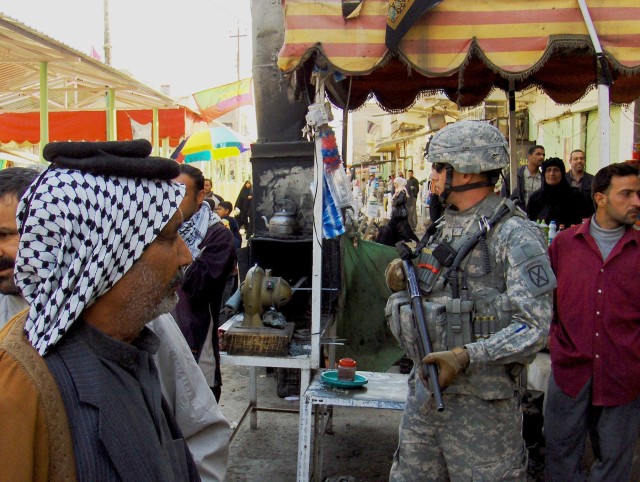WASHINGTON (American Forces Press Service, March 12, 2007) - Although recent operations to secure Baghdad are off to a good start, Americans must be patient in expecting progress, a senior coalition spokesman said in Baghdad today.
It will take several months before all additional coalition forces arrive in the Iraqi capital, Maj. Gen. William Caldwell said.
Operation Enforcing the Law will take time to implement, Caldwell said during a news conference with Iraqi Brig. Gen. Kassim Atta al-Moussawi, an Iraqi military spokesman. "Two of the five additional United States brigades have arrived and are currently operating inside Baghdad," Caldwell said. "The third is beginning to arrive in Kuwait at this time."
He added that it will be late May before all the additional forces arrive and begin operating in Baghdad and Anbar province.
Between 5,000 and 7,000 U.S. troops will support the original surge of 21,500 troops, which President Bush called for in January. "These will be units such as logistical support, military police and aviation assets so we can increase the mobility of both the Iraqi security forces and coalition forces," Caldwell said.
Ha also announced that the Caucasus nation of Georgia will triple its contribution to the coalition to more than 2,000 Soldiers.
All of this helps provide the security needed for the Iraqis to develop political solutions, Caldwell said. "The military solution can effect the environment in which these political solutions are conducted," he said.
Early markers show that sectarian violence is down in Baghdad, and that families who left are returning in some neighborhoods, Kassim said. He added that Iraqi forces will continue to operate in support of Baghdad security operations.
Iraqi and coalition forces will operate in all areas and against all anti-Iraqi forces "without exceptions," Kassim said.
Despite the signs of hope, groups like al Qaeda in Iraq continue to launch attacks against the innocent in order to provoke sectarian fighting, Caldwell said. The terrorist group wants to "create instability and sow division among the Iraqi people," he said.
The general noted that the combined forces have a tough job because terrorists can strike where they choose, Iraqi and coalition forces have to protect all Iraqis everywhere.
The attack on the Habbaniyah mosque in February proves "that al Qaeda does not represent any sectarian group, but is fully prepared to murder scores of Sunni Arabs in an attempt to prevent Iraqis from determining their own future," Caldwell said.
Since February, Iraqi and coalition forces have conducted more than 200 joint operations against al Qaeda objectives, resulting in the deaths of more than 100 terrorists and the detention of more than 400 others. More importantly, Caldwell said, more tips are coming in from Iraqis, who are increasingly standing up to these terrorist forces.
<b> Protecting the Pilgrims</b>
Iraqi army and police forces worked together to provide security for the more than 6 million pilgrims traveling to Karbala to observe the Shiite ritual of Arbaeen. Anti-Iraqi forces targeted the pilgrims, and they were successful in a number of cases, most notably with a car bomb that killed more than 100 pilgrims on March 6. Kassim said that insurgents killed more than 150 pilgrims.
Arbaeen marks the end of 40 days of mourning for the Imam Hussein, the Prophet Muhammad's grandson, who was killed in 680. The imam and 72 followers died at the hands of fellow Muslims who sought to prevent the imam from becoming caliph, or Muslim leader. The caliphate became the foundation of Sunni Muslim rule, and the killing of Hussein was the start of the Sunni-Shiite split. Karbala is the home of the imam's tomb and has been a site of pilgrimage since his death.
Shiite Muslims from Iraq, Iran, the Gulf States and other areas travel to Karbala and engage in ritual flagellation in remembrance of the imam. During the Saddam Hussein regime, Shiite Muslims could not mark the celebration. Iraqi and coalition officials say this year has seen the largest Arbaeen celebration in decades. The rituals ended March 10.
Kassim, speaking through an interpreter, said the volume of threats in Iraq and the volume of pilgrims made Arbaeen a potentially dangerous situation. "The enemy targets the innocent people -- children, students," he said. "This is clear evidence of the terror of these groups."
Despite Iraqi security forces' limited capabilities, the Iraqi forces did well against the security threats, Kassim said, noting the forces discovered a number of caches of arms and munitions. They also foiled a number of attacks. They cooperated well with each other and the coalition, and they built trust with the Shiite majority of Iraq, the general said.
The operation to protect Karbala involved the office of the minister of national security, the governor of Karbala governate, the Ministry of Defense and the Ministry of the Interior. "There was daily cooperation between forces in Karbala and Baghdad," Kassim said. "The great efforts ... exerted achieved good results in this plan."


Social Sharing